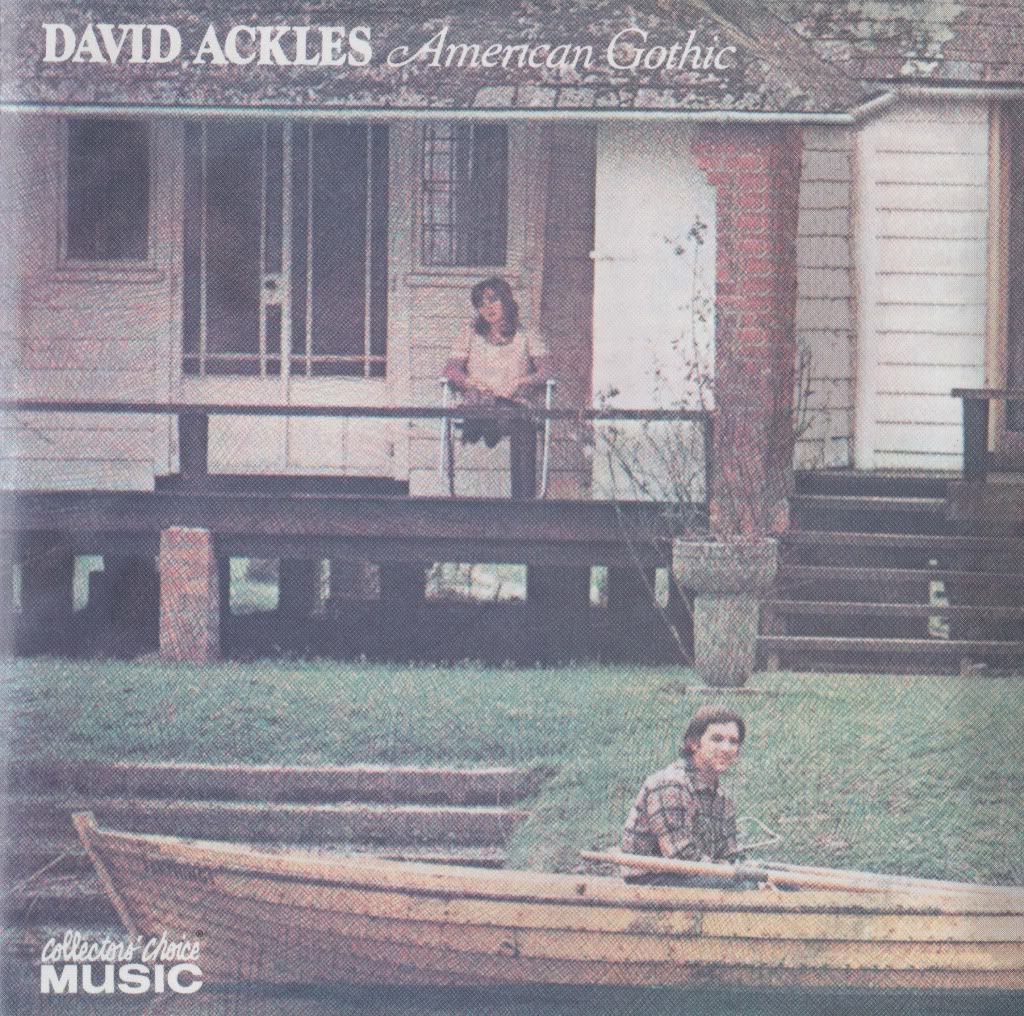Friday, October 14, 2011
David Ackles - American Gothic
Continuing this week's re-re-refocus on singer/songwriters, here's something almost completely different. Though he'd already released two full-length albums full of seedy, proto-Tom Waits character sketches by 1972, American Gothic is where David Ackles' unique and gritty vision reached full flower conceptually and musically.
As its title suggests, American Gothic is an attempt to paint a kaleidoscopic picture of American life (as he sees it) through a series of character narratives and internal monologues. As sprawling a project as this may sound, Ackles manages to avoid the pitfall of overreaching in attempts to be all-inclusive by imagining himself quite snugly into extremely focused and well-drawn characters and situations. From the title track's comically unhappy couple (a cuckolding wife who's true love is shoes and her porn-reading drunk of a husband) to the deliberate cheese of the traveling musician's "One Night Stand" to the choking malaise of Vietnam's effects on American society ("Ballad of the Ship of State") to a brilliantly succinct summation of the "Oh, California!" mentality with "Let's be happy until the sun goes out" to the blithe ignorance to the Native American experience on "Blues for Billy Whitecloud" to the touching rumination on the all-too-characteristically-American divorce rate in "Waiting for the Moving Van," Ackles proves his skills as an insightful and subtle songwriter again and again. It seems at least part of his greatness rests in his ability to balance mordant wit and cutting appraisals with genuine heart, empathy and a constantly evident love for the totality of what he sees as American life, as especially evidenced on the desperate, cathartic redemption of "Another Friday Night" and a respectful exploration of communal religious music experience on "Family Band."
What unmistakably sets this apart from most of the singer/songwriter material I've shared is the music--there's barely a guitar in sight on American Gothic, with Ackles playing his own quite accomplished piano parts aided by a not inconsequential amount of orchestration--in comparison with the other two orchestrated albums I've discussed this week, Ackles' work reveals another distinct aspect of the practice--though his songs would easily stand alone with piano and voice arrangements, the style of the music almost necessitates a wealth of other instrumental textures. Using a near-encyclopedic lexicon of musical styles, Ackles imbues his songs with jazz, rag, R&B, classical, gospel, folk and pop elements, occasionally within single songs ("Midnight Carousel"). As such, there are few other contemporary singer/songwriters to compare him with--while there's a similarity to Randy Newman and Ackles obviously paved the way for the tears-in-the-beer antics of early Tom Waits, his sincerity sets him apart from Newman and it's clear he isn't trying quite as hard to contrive a persona as Waits has. In some ways, Ackles songs play more like musical theater--the American musical style blending of Rodgers and Hammerstein driven by some of the darkness of Brecht/Weill all funneled through Ackles' powerful, distinctive and closely-controlled (if often cigarette-husky) baritone. I think the fact that Ackles' chosen style has little precedent in the pop music world (not to mention the fact that most people, on hearing it, associate it with musical theater and quickly dismiss it) obviously consigned this album to continued obscurity. Even many of today's relic hunters seem quick to write off the album based purely on a lack of understanding of Ackles' stylistic choices--it's not like they're offering similarly-arranged music they think is better.
Part of the reward of stretching to meet this album halfway is keeping in mind that not all artistic pop music has to fit the rock template that's dominated since the late 1950's--once you accept that Ackles' primary aesthetic compass is one that dates back to a time when the blaring horns and abrupt theatrical chord changes were actually a part of the public's conception of pop music, it's appreciable how well he manages to seamlessly update those building blocks to (1972) modern times and fill the spaces with a mature artistic vision. This is probably best exemplified in the majestic and brilliant album-closing "Montana Song," which tells a multi-generational American family's story across Copland-influenced orchestral arrangements and a narrative that sums up the classic American life adventure against the starkness of nature, bound together only by the bonds of family, eventually complicated by the progress of time and children's new adventures, and finally resolved by the great-grandchild's connection with the distant context of his modern life. Though it takes some effort to reset your ears' expectations to Ackles' willfully non-pop style, the effort is well worth it for a prolonged glimpse into the man's vision of American life past, future and his somehow even more diverse, limitless present.
Subscribe to:
Post Comments (Atom)


2 comments:
Excellent review, thanks. Mind if I add a link to the links section of my chords & lyrics site?
Thanks Kasper,
I'd be delighted to be linked on your site. I'll go check it out right now!
Post a Comment